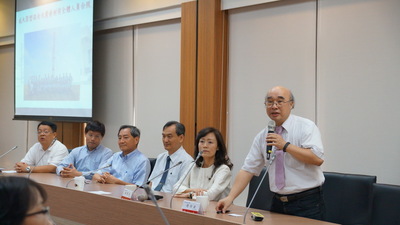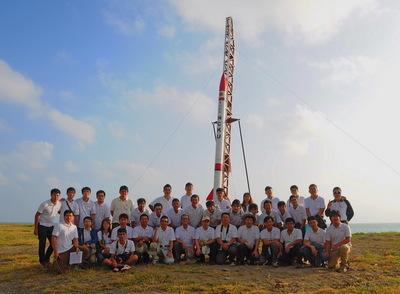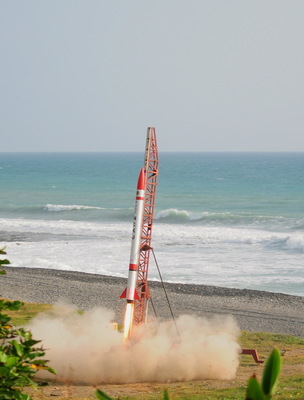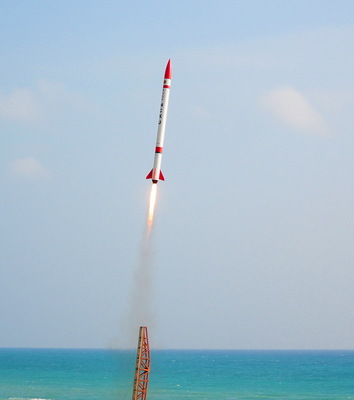NCKU launches hybrid rocket to record high




Tainan, Taiwan, November 9, 2015
A research team led by Distinguished Professor Yei-Chin Chao from the Institute of Aeronautics and Astronautics, National Cheng Kung University (NCKU), Tainan, Taiwan, designed a 1000kg hybrid rocket which had been successfully launched on October 28, the university revealed today at a press conference.
The rocket was launched from Mudan Township in Pingtung, and reached an altitude of 9km, which is higher than any other hybrid rocket launched by a university team anywhere in Asia, said Prof. Chao.
At the press conference, NCKU President Huey-Jen Jenny Su hailed the scientific breakthrough and said that the team will bring the name of NCKU into the space.
The hybrid rocket is entirely designed and manufactured by NCKU and the interdisciplinary efforts involve experts from the electric engineering, astronautics and aeronautics, according to President Su.
She added that the successful launch of the hybrid rocket is significant, demonstrating our great research capacity.
NCKU has researched hybrid rocket motors for over 15 years, and has fully grasped the key technology for developing such rockets.
The rocket’s launch required 1,000 kilogram-force (kgf) of thrust, Prof. Chao said.
He noted, this is a key technological breakthrough that indicates that hybrid rockets can progress beyond testing and start to have practical applications.
The rocket is 5.3m high, with a diameter of 28cm and weighed 194kg at takeoff, according to Prof. Chao.
Rocket engines are often divided into three types — solid-propellant rockets, liquid-propellant rockets and hybrid propellant rockets — with propellants providing the fuel and the oxidizer required for combustion.
The team’s rocket uses a hybrid propellant system with paraffin wax and hydroxyl-terminated polybutadiene (HTPB) as solid fuel grain, and non-toxic and environmentally friendly liquid nitrous oxide as an oxidizer, Prof. Chao said.
He also pointed out, all the components of the rocket were designed and developed locally and the technology could be applied to both national defense and space exploration.
The research team would continue to develop new types of rockets and aimed to reach an altitude of 100km, Chao said.
Enditem/
A research team led by Distinguished Professor Yei-Chin Chao from the Institute of Aeronautics and Astronautics, National Cheng Kung University (NCKU), Tainan, Taiwan, designed a 1000kg hybrid rocket which had been successfully launched on October 28, the university revealed today at a press conference.
The rocket was launched from Mudan Township in Pingtung, and reached an altitude of 9km, which is higher than any other hybrid rocket launched by a university team anywhere in Asia, said Prof. Chao.
At the press conference, NCKU President Huey-Jen Jenny Su hailed the scientific breakthrough and said that the team will bring the name of NCKU into the space.
The hybrid rocket is entirely designed and manufactured by NCKU and the interdisciplinary efforts involve experts from the electric engineering, astronautics and aeronautics, according to President Su.
She added that the successful launch of the hybrid rocket is significant, demonstrating our great research capacity.
NCKU has researched hybrid rocket motors for over 15 years, and has fully grasped the key technology for developing such rockets.
The rocket’s launch required 1,000 kilogram-force (kgf) of thrust, Prof. Chao said.
He noted, this is a key technological breakthrough that indicates that hybrid rockets can progress beyond testing and start to have practical applications.
The rocket is 5.3m high, with a diameter of 28cm and weighed 194kg at takeoff, according to Prof. Chao.
Rocket engines are often divided into three types — solid-propellant rockets, liquid-propellant rockets and hybrid propellant rockets — with propellants providing the fuel and the oxidizer required for combustion.
The team’s rocket uses a hybrid propellant system with paraffin wax and hydroxyl-terminated polybutadiene (HTPB) as solid fuel grain, and non-toxic and environmentally friendly liquid nitrous oxide as an oxidizer, Prof. Chao said.
He also pointed out, all the components of the rocket were designed and developed locally and the technology could be applied to both national defense and space exploration.
The research team would continue to develop new types of rockets and aimed to reach an altitude of 100km, Chao said.
Enditem/
Provider:
NCKU NEWS
Date:
2015/11/09



